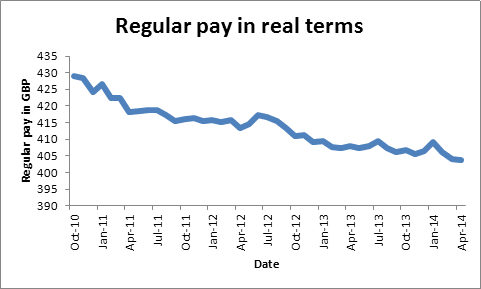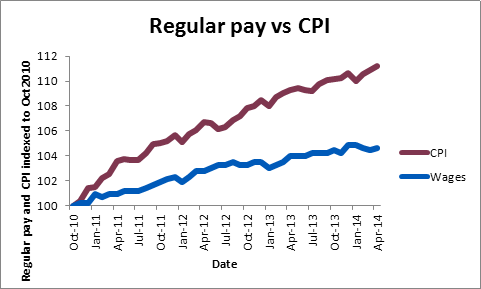Workers are still waiting for a financial recovery
Figures released by the ONS today revealed what many households already know – that their wages aren’t keeping up with rising everyday costs.
New analysis from Citizens Advice of wage data since October 2010 has shown that increases in wages have consistently fallen behind inflation meaning people are struggling to make their incomes stretch to cover everyday costs like rent, energy and food bills. While workers and jobseekers will be relieved to hear that the unemployment rate is still falling, the news that wage rises have stuck behind inflation is a blow.
Even as employment and pay rise, the widening gap between inflation and wages have left people with less money in their pockets as bills shoot further and further out of reach. March’s figures seemed to show wages rising above inflation, which was heralded as a turning point for people who have been feeling the pinch. But our analysis has found that many households have actually seen a consistent fall in what their pay packets can cover. Looking at real wages vs inflation on a month by month basis, rather than using the ONS’s method of monthly inflation figures and a three month average for employment, shows that workers have faced years of consistent falls.

Gillian Guy, Chief Executive of national charity Citizens Advice, said:
“People’s wages aren’t keeping up with rising prices. Falling unemployment will help some households to back on their feet, but there are still serious, ongoing problems in the labour market.
“Every day, CAB helps people who have been pushed over the edge by years of sustained falls in the value of their pay packets. It’s vital that people are able to find secure, sustainable work which pays a consistent income and means that they can keep ahead of rises in the cost of essentials.
”For many people, self-employment is a step back into work. There’s a risk that the rise in self-employment masks a rise in people in unstable, low-paid work. People who are self-employed are just as likely to come to Citizens Advice for help with debt as people who are unemployed, and are more likely to seek advice on bankruptcy.”
What really makes a difference to people struggling to make ends meet is how wages are in real terms. On this measure, wages excluding bonuses are down £25 per week since 2010, and are still falling. Real wages dipped again during April, making it even harder for people to make their incomes meet the rising cost of essentials.

The ONS has, rightly, blamed the slump in wages on the comparison with April 2013’s data. Last year, high-earning workers delayed bonuses in order to benefit from the lower 45p tax rate, which came in in April 2013, meaning that wages for the month were artificially high.
Most workers haven’t felt the benefit of the budding economic recovery. As our analysis shows, if you take out high earners’ bonuses and only look at regular pay against inflation, it’s easy to see why.

Notes to editors:
- The Citizens Advice service comprises a network of local bureaux, all of which are independent charities, the Citizens Advice consumer service and national charity Citizens Advice. Together we help people resolve their money, legal and other problems by providing information and advice and by influencing policymakers. For more see the Citizens Advice website.
- The advice provided by the Citizens Advice service is free, independent, confidential, and impartial, and available to everyone regardless of race, gender, disability, sexual orientation, religion, age or nationality.
- To find your local bureau in England and Wales, visit citizensadvice.org.uk. You can also get advice online at adviceguide.org.uk
- You can get consumer advice from the Citizens Advice consumer service on 03454 04 05 06 or 03454 04 05 05 for Welsh language speakers
- Citizens Advice Bureaux in England and Wales advised 2.3 million clients on 5.4 million problems from October 2013 to September 2014. For full 2013/2014 service statistics see our quarterly publication Advice trends
- Citizens Advice service staff are supported by more than 21,000 trained volunteers, working at over 3,000 service outlets across England and Wales.

